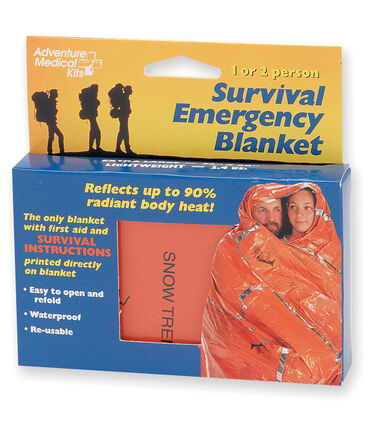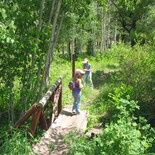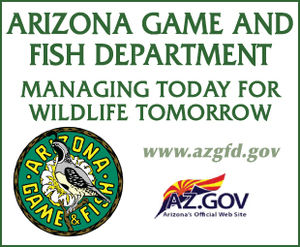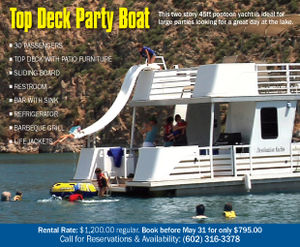Lost
A Little Preparation Can Save A Life
March 1, 2021
I will never forget the first (and last!) time I got lost. I was deer hunting with my dad and my brother in Kaibab on the North Rim. I was walking through the forest with my dad and got sidetracked by something, and before I knew it, I was lost. Dad was nowhere in sight and of course, I had paid absolutely NO attention to our ramble so I had no idea where camp was. The first thing I did was start running around hollering for my dad. No answer. I was about ten years old and I was panicked, but then I slowly began remembering the things my dad had taught me. First, to calm down.
Game Trails
I took a few deep breaths and started to look around. Contrary to what you hear, it isn't that easy to tell direction from the sun. Sunrise and sunset move quite far along the horizon over the year, and once the sun is up higher, it's even harder to use it for direction. However, I did remember the position of the sun when we left camp, so I started walking, keeping it reversed
. My dad had also told me if I ever got lost, to look for game trails. Game trails always lead to water, he said, and water almost always has a road to it. Sure enough, eventually I came across a forest service road. I randomly chose a direction and started walking. After a short while, my brother came walking down the road the other way. He gave me a hard time, but by then I wouldn't have cared what he said – I was just so happy to see him!
Reading Maps
After that incident, I learned how to read maps. Not just to be able to tell where things are, but how to locate myself on a map using a compass. This was back in the day before GPS and cell phones. My dad taught map reading at different Army bases all over the country, so I had a great teacher.
From then on, whenever we made camp, dad and I would take out the compass and map and triangulate our position on the map, then mark it with an X. When we headed out walking, I took the map and compass with me. That way, if I got lost, I'd be able to find out exactly where I was, and more importantly, which direction camp was. But you know what? I never did get lost again.
Paying Attention
The reason I never again got lost is because from then on, I paid attention to where I was going. Sounds simple, right? If you're on a hiking trail it's hard to get lost unless you wander off the path, but when you are hunting you always strike out into open country or forest and unless you make it a point to remember landmarks and things like that, it's very easy to get lost.
Nowadays with GPS units and cell phones, you can drop a pin where you leave your car and get back to it pretty easily. Easily, that is, if you have your phone charged and the signal isn't blocked. I still carry plenty of paper maps with me, but now they are mostly so I can decide what things I want to go see and the best way to get there.
Topo Maps
Now I use an app called Topo Maps. This app allows you to download hi-res digital maps that are exact replicas of the paper quadrant maps from the USGS. The app doesn't need cell service to work once the maps are downloaded. Download them at home, and from then on you can use them anywhere. I have the entire state of Arizona on my phone. But the best part is that when you open the app, it shows you exactly where you are, and the dot moves along as you do so you can see right away if you're headed the right direction. You can also drop pins to mark anything you like, so you can easily mark your car.
I carry my phone with me everywhere I go anyway, and when we are out hiking or hunting or adventuring, I also carry a portable charger with me so I don't have to worry about my phone dying. I also keep it plugged in when we're in the vehicle.
How To 'Lost-Proof' Yourself, Your Kids
Obviously, the best thing to do is not get lost in the first place. As an adult, make sure you have a GPS locator with you and make sure to mark where your car or camp is before striking off. This is essential – knowing where you are is worthless if you don't know where you need to be.
Talk To Them
For kids, especially young ones without phones, you need to make sure to talk to them about getting lost, including how to avoid it and what to do if they do get lost. Also, you need to make sure you equip them with what they need if they do get lost. You can put everything they need in a very small day pack or fanny pack. Here's what should be in it:
1. Very loud whistle
2. Blaze orange hunters vest
3. Blaze orange cap, bandana, or knit hat
4. Granola bar
5. Emergency water pouch (4-oz sealed pouches available at outdoor stores)
6. Emergency blanket or large garbage bag with holes cut for head and arms
7. Signaling mirror
Make Kit Together
Make this little kit together with your child, and explain what everything is and how to use it. The instant your child suspects that he is lost, he should know to pull out the vest and cap and put them on. This makes him very visible and much easier to find. The whistle should be as loud as you can find. A whistle travels further than a shout, and shouting will just wear your kid out.
The granola bar is pretty much comfort food, but in the off chance that it takes you a while to find him, he'll appreciate something to eat and drink. The emergency blanket and garbage bag are to help keep him warm if he's out towards dark. The blaze vest should go over the bag. You can also put a couple of glow sticks in the pack in case he is out after dark. They'll make him visible and be a comfort as well. Nobody likes to be alone in the dark.
Kids have a tendency to curl up under cover when they get scared, so make sure you emphasize the need to stay where they can be seen. Signaling mirrors are pretty cheap, and they are made of metal. Practice using one with your child so he knows how they work. Odds are you'll find him quickly if he stays visible, but having the signaling mirror is comforting.

The packs for your kids can be very small and light. In fact, they should be, so the kids won't mind having them on. This is Trinity and Emily on the Petroglyph Trail at Lyman Lake State Park.
When our grandkids got older and understood fire restrictions and forest fire dangers, I also taught them how to make a fire without matches, and I included a fire starting kit in their bags. They also always carried extra water, and still do now that they are grown up and hiking on their own and with friends. They never had to use their "lost kits", thank goodness.
A Little Preparation Can Save A Life
The important thing is to talk to your kids about the possibility of getting lost before you ever go out. A lot of kids never even think about it. Also, talk to them often about what to do if they do get lost. I'm sure glad my dad did that! It wouldn't hurt for you to carry some blaze orange and a mirror as well. We've all seen those movies where the lost people stand around screaming and waving their arms as the copters fly over them without seeing them. Don't be those people. A little preparation can save your life or th























Reader Comments(0)